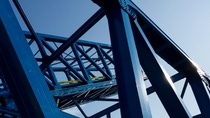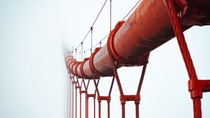Newsletter Resins & Additives for Coatings
Cutting the cost of corrosion
Everybody knows about rust, but very few people know the scale at which it affects industries worldwide, or what the overall cost of corrosion is.
A survey by NACE International estimates that the total damage caused by corrosion costs us around $2.5trn a year – that’s over 3% of global GDP. But the good news is that much of this damage is avoidable. The International Association of Corrosion Engineers says that, through the implementation of proper corrosion control practices, 15-35% of the cost of corrosion could be saved. That equates to a $375-875bn boost to the economy, through avoiding equipment failures, incidents and outages caused by corrosion. How can each individual organization contribute to making this saving a reality? The key is to combine the most effective corrosion technology with a clear and justified system for managing corrosion.
Protection principles
It may not be possible to prevent rust entirely – but steps can be taken to delay it, reduce it and lessen its severity. Corrosion is triggered by electrochemical processes that are accelerated by exposure to water and oxides – so coating objects to limit their exposure can have a noticeable effect in avoiding the onset of rust.
Treatment efficacy can vary depending on a host of local factors – temperature, weather conditions, substrate material, nearby objects, industrial application and so on – so it’s important to source the correct protective coating and to have access to the right knowledge and advice on corrosion management.
Strength, simplicity, sustainability
That’s why BASF’s core message to those who care for metal surfaces is: We offer you solutions with proven performance in the field, a broad portfolio with benefits for every field of application, and 360-degree support to enable you to get the best from your products.
BASF offers an optimized portfolio of acrylic dispersions for protective coatings – designed to not just improve results, but also decrease cost-in-use for customers while maintaining a sustainable outlook.
“Our aim is to give customers solutions that make them more competitive even in difficult times like during the Corona pandemic,” said Christophe Hemmer, Head of Marketing Automotive & Industrial Coatings at BASF. “We provide forward-thinking products that seek to solve the problems of today as well as preparing for the challenges of tomorrow. The core value of our Acronal® PRO and Joncryl® PRO series is simple: No longer do customers have to make a choice between performance, cost efficiency and sustainability. They can have it all in one.”
Explore our portfolio
The Acronal® PRO series is known for its reliable adhesion, reducing the rework time required. For light- to medium-duty primer applications, Acronal® PRO 7600 offers wide-ranging efficacy on steel and galvanized surfaces, especially for dipping applications. Meanwhile, Acronal® PRO 770 is a high-performance dispersion for primer and glossy DTM that can save energy and cost as well as boost sustainability.
Joncryl® PRO 1522 offers excellent results on DTM applications, combining good protection and high gloss with low VOC content, low film thickness and versatility of applications (brush, roller, spray and dip are all supported).
Additionally, customers can reduce their CO2 footprint by using the biomass balanced product versions. Thus, biomass is fed into chemical production process and then virtually allocated to the coating raw material (Biomass Balance Approach). For instance, to paint one electricity pylon with e.g. Acronal® PRO 770 MB one can save 37 kg of CO2. With about 150,000 electricity pylons in Germany, the savings add up to 5550 t of CO2.




